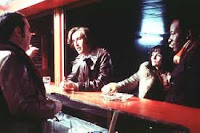In the lead up to the Oscars earlier this year there did really only seem to be one title that would take out the Best Doco prize. The Cove won pretty much everything in the lead up, from critics awards to audience awards at Sundance and Sydney Film Fests. There were contenders of course (I've just watched Food, Inc., which was also very good and will be up on here soon) but The Cove seemed to just grab people and not let them go.
won pretty much everything in the lead up, from critics awards to audience awards at Sundance and Sydney Film Fests. There were contenders of course (I've just watched Food, Inc., which was also very good and will be up on here soon) but The Cove seemed to just grab people and not let them go.
And it's a damned good film. Even excluding it being a documentary, it ranks among the best films of the year, narrative or otherwise. This isn't just a good documentary - it's a thrilling and terrifying motion picture.
Ric O'Barry was the trainer of the dolphins for the original Flipper television series. However, after one of his dolphins 'committed suicide' in his arms one day he suddenly turned around, becoming an advocate for dolphin freedom, despite all of the work he had put into them becoming such popular entertainment in captivity. To this end he is followed to a little town called Taiji in Japan, where he is very well known for his attempts to expose and stop not only the capturing of dolphins for use in dolphinariums, but also the horrific slaughter that takes place in a hidden cove surrounded by unforgiving cliffs and entirely sealed off from prying outside eyes.
Director Louie Psihoyos and O'Barry set about exposing the truth of what is going on. They are motivated not only by the animal rights aspect, but also the sever health issues associated with eating dolphin, which is being sold as whale meat around the country and is even being pushed into schools for lunches. Dolphin meat contains very, very high levels of mercury, and no one wants a repeat of the Minamata incident of the 1950s.
So, the pair assemble a crack team of various skills to set about capturing footage and sound of what is going on. They have the world champion freedivers, who are going to plant cameras and microphones under water. They have help from Industrial Light And Magic, making false rocks to hide cameras in. People help them smuggle in equipment that is really only for the American military. All of them pitch in, risking a lot including being arrested, to help Ric uncover the truth. And it is a shocking, shocking truth, very confronting.
Psihoyos has crafted a terrific film in The Cove, utilising the conventions of heist films and thrillers to keep you on the edge of your seat. Under cover of darkness, with cameras picking up heat to warn of approaching guards or police, with Ric playing decoy, the team go in to plant all of the items, and it is tense! It's tense like any Hollywood blockbuster would hope for, but then it's also real.
It was one of the more riveting documentaries I've watched, not reliant on the standard talking head because everything else they're doing is so damned interesting. There is just so much intrigue and action going on. A remarkable achievement.
And, it must be said, I went to my supermarket a few days later to buy salmon and caught myself making sure it was farmed, worrying about whether or not I should be eating it at all, thinking about dolphins screaming underwater. It was a good film with a message that resonated deeply and strongly, and will continue to do so, I hope, for a long, long time. 5 stars.





















